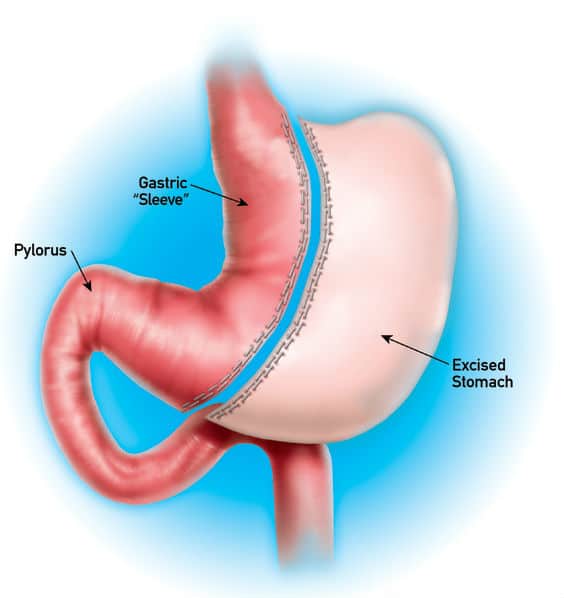Sleeve Gastrectomy
The sleeve gastrectomy – often called the sleeve or gastric sleeve – is a weight loss surgery performed by removing approximately 80 percent of the stomach through small incisions. The remaining stomach is a tubular pouch that resembles a banana.
The Procedure
The sleeve gastrectomy is performed using a minimally invasive technique, with several small incisions and a long camera. The stomach is mobilized and the surgeon uses a surgical stapler to remove 80% of the stomach, leaving a small remaining pouch.
This procedure works by several mechanisms. First, the new stomach pouch holds a considerably smaller volume than the normal stomach and helps to significantly reduce the amount of food (and thus calories) that can be consumed. The greater impact, however, seems to be the effect the surgery has on gut hormones that impact a number of factors including hunger, satiety, and blood sugar control.
Short term studies show that the sleeve is as effective as the roux-en-Y gastric bypass in terms of weight loss and improvement or remission of diabetes. There is also evidence that suggest the sleeve, similar to the gastric bypass, is effective in improving type 2 diabetes independent of the weight loss. The complication rates of the sleeve fall between those of the adjustable gastric band and the roux-en-y gastric bypass.

Benefits
- It’s quicker and simpler than gastric bypass surgery.
- It results in an average of 60% excess weight loss.
- More weight loss than Lap Band and slightly less than gastric bypass.
- Reduces hunger.
- Does not require band adjustments like Lap Band surgery.
- Weight loss is rapid. The majority of weight loss occurs in the first year after surgery.
Complications
- Leak from the surgical staple line
- Lower risk of dumping syndrome unlike gastric bypass.
- Narrowing of the remaining stomach, requiring revision / more procedures
- Infection
- Bleeding
- Blood clots
- Nutritional deficiencies
- Gallstones
- Heartburn
After the Procedure
A sleeve gastrectomy alone is not a quick fix for obesity or obesity-related health conditions. A lifestyle change is necessary to enhance results. After weight loss surgery, it is imperative that you eat healthy foods, control portion sizes, and exercise. If you do not follow the regimen set for you, complications and unfavorable weight loss results can occur.